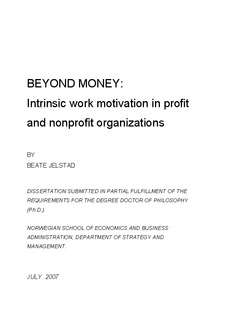| dc.description.abstract | The purpose of this study is threefold. Firstly, the antecedents of intrinsic work motivation are
investigated. The role of job autonomy, relatedness at work, perceived competence and the
individual difference of autonomy orientation on intrinsic motivation were explored.
Secondly, the purpose of this research is to investigate the link between intrinsic work
motivation and the outcome variables performance and turnover intention. Thirdly, the extent
to which the two previous objectives are contingent upon type of organizations is examined.
The proposed hypotheses are based on Self-Determination Theory, the Job Characteristics
Theory as well as a qualitative pilot study.
The present study contributes to previous work on intrinsic motivation by contrasting one
profit and one nonprofit organization that differ in terms of external (monetary) motivators.
Moreover, contribution to the knowledge base on intrinsic motivation in organizations is
made by responding to calls for research on social factors influencing motivation and by
proposing alternative hypotheses regarding the role of individual differences.
The hypotheses and the model were empirically tested on a sample of 261 respondents from
one profit and one nonprofit organization within the health sector in Norway. The results
showed that job autonomy, relatedness at work and the individual difference of autonomy
orientation were positively associated with intrinsic motivation. The alternative hypothesis of
autonomy orientation as a moderator variable was not supported. The link between the three
antecedents and intrinsic motivation were mediated by perceived competence. A positive
relation between intrinsic motivation and performance and a negative association between
intrinsic motivation and turnover intention were found. No differences in intrinsic motivation
in the two organizations were found. Invariance analyses in structural equation modeling
showed that there were no differences in path coefficients between the profit and nonprofit
organization. Theoretical and practical implications are derived from this study, and directions
for future research are provided. | en |
